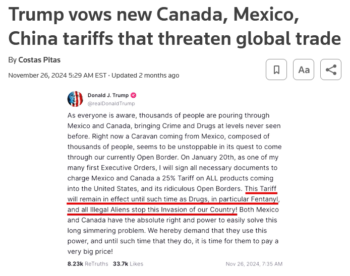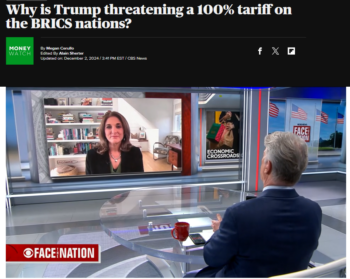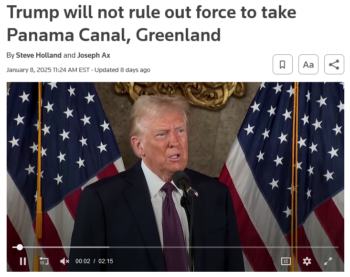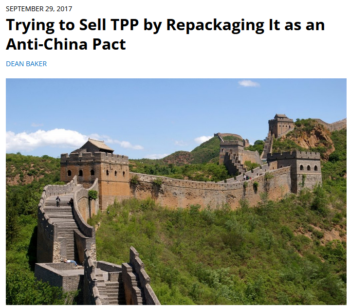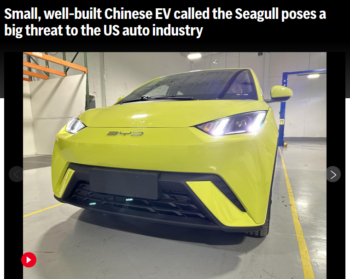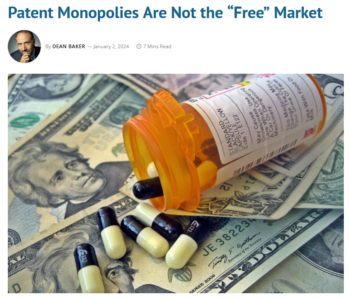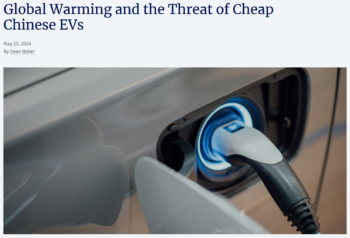
Janine Jackson interviewed CEPR’s Dean Baker about China trade policy for the January 10, 2025, episode of CounterSpin. This is a lightly edited transcript.
Janine Jackson: New York Times columnist Thomas Friedman’s December 17 piece, headlined “How Elon Musk and Taylor Swift Can Resolve US/China Relations,” contained some choice Friedmanisms, like “more Americans might get a better feel for what is going on there if they simply went and ordered room service at their hotel”—later followed, quaintly, by “a lot of Chinese have grown out of touch with how China is perceived in the world.”
But the big idea is that China has taken a “great leap forward in high-tech manufacturing” because of Donald Trump, who, a source says, “woke them up to the fact that they needed an all-hands-on-deck effort.” And if the US doesn’t respond to China’s “Sputnik” moment the way we did to the Soviet Union, Friedman says, “we will be toast.”
The response has to do with using tariffs on China to “buy time to lift up more Elon Musks” (described as a “homegrown” manufacturer), and for China to “let in more Taylor Swifts,” i.e., chances for its youth to spend money on entertainment made abroad. Secretary of State Tony Blinken evidently “show[ed] China the way forward” last April, when he bought a Swift record on his way to the airport.
Okay, it’s very Thomas Friedman. But how different is it from US media coverage of China and trade policy generally?
Dean Baker is senior economist and co-founder of the Center for Economic and Policy Research, where Beat the Press, his commentary on economic reporting, appears. He’s the author of, among other titles, Rigged: How Globalization and the Rules of the Modern Economy Were Structured to Make the Rich Richer. He joins us now by phone from Utah. Welcome back to CounterSpin, Dean Baker.
Dean Baker: Thanks for having me on, Janine.
JJ: We will talk about news media, of course, but first, there is Trump himself. It’s not our imagination that Trump’s trade ideas, his actions and his stated plans—about China, but overall—they just don’t make much consistent or coherent sense, do they?
DB: Obviously, consistency isn’t a strong point for him, but it does obviously matter to other people. So before he is even in office, he’s threatening both Mexico and Canada. It wasn’t even that clear, at least to me, maybe they got the message what he wants them to do, but if they don’t stop immigrants coming across the border with fentanyl, then he’s going to impose 25% tariffs—I’m going to come back to that word in a second—on both countries.
Now, we have a trade deal with both countries—which, as far as I know, and he certainly didn’t indicate otherwise, they’re following. And it was his trade deal. So what exactly is he threatening with? He’s going to abrogate the trade deal he signed four years ago, because of what, exactly?
And they actually have cooperated with the US in restricting immigrants from coming across the border. Could they do more? Yeah, well, maybe. Canada tries to police fentanyl. So it’s not clear what exactly he thought they would do. Now he’s just said he wants to annex Canada anyhow, so I guess it’s all moot.
But the idea of making these threats is kind of incredible. And, again, he’s threatening, coming back to the word tariff, because a lot of people, and I think including Donald Trump, don’t know what a tariff is. Tariffs are a tax on our imports, and I’ve been haranguing reporters, “Why don’t you just call it a tax on imports?” I can’t believe they can’t use the three words, one of them is very short, instead of tariff, because a lot of people really don’t understand what it is.
And the way Trump talks about it, he makes it sound like we’re charging Canada or Mexico or China, he’s imposing his tariff on, we’re charging them this money, when what we’re actually doing is, we’re charging ourselves the money.
And there’s an economics debate. If we have a 25% tariff on goods from Canada, how much of that will be borne by consumers in the US? How much might be absorbed by intermediaries, and how much might be the exporters in Canada? In all cases, it’s not zero, but almost all, and there’s a lot of work on it, finds that the vast majority is borne by consumers here.
So he’s going to punish Canada, going to punish Mexico by imposing a 25% tax on the goods we import from them, which I think to most people probably wouldn’t sound very good, but that is what he’s doing, and it’s kind of a strange policy.
Now, getting to China, I’m not sure what his latest grievance is with China. I’m sure he’s got a list. But he’s talking about a 100% tax on imports from China, and following on the Friedman article, China is at this point, I’m not going to say a rich country, in the sense that, if you look at the average income, it is still considerably lower than the US, and you have a lot poor people in rural areas in China. But in terms of its industrial capacities, it’s huge, and it actually is considerably larger than the United States. So the idea that somehow he’s going to be bringing China to its knees, which seems to be what he thinks—I’m not going to try and get in his head, but just based on what he says, that seems to be what he thinks—that’s a pretty crazy thought.
JJ: And, certainly, we have learned that tariffs are a misunderstood concept by many in the public, and some in the media, as well as some in political office. But that whole picture of Trump threatening to pull out of a deal, in terms of Canada and Mexico, that he made himself, all of that sort of stuff gets us to what you call your “best bet for 2025,” which is improved and increased trade relations between Europe and China. Let’s not be surprised if that happens, for the very reasons that you’re laying out about Trump’s inconsistencies.
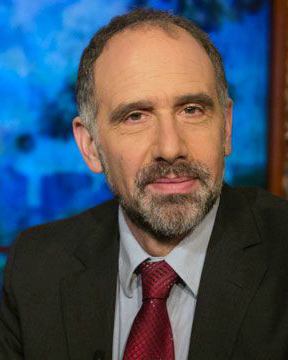
Dean Baker: “Trump is saying he doesn’t care about whatever agreements we have, including the ones he signed.” (image: BillMoyers.com)
DB: Basically, Trump is saying he doesn’t care about whatever agreements we have, including the ones he signed. And this has been the way he’s done business throughout his life: He signs a contract, and he doesn’t make good on it. So he has contractors that do things for him, build a building or put in a heating system, whatever it might be. He just says, “no, I’m not going to pay you, sue me.” And maybe he pays half, maybe he pays nothing. He’s prepared to go to court, and spend a lot of money on lawyers. It’s come to be the pattern that most people, including lawyers, insist on getting paid in advance, because they know if they do their work and then come to collect from Trump, they’re not going to get it.
And that’s his approach to international relations as well. So treaties don’t mean anything to him.
And we could have lots of grounds for being unhappy with China. They have a bad human rights record. I’m not going to try to defend it. I don’t think anyone would try to defend it. There are other things you could point to that are not very pretty about China, but just from the standpoint of doing business, they largely follow through on their commitments. Trump doesn’t.
So from the standpoint of Europe, if you want to have trading partners that are reasonably reliable, and won’t pull things out of the air and say, “I want you to do this, I want you to do that,” China looks a hell of a lot better than the United States.
JJ: And so we shouldn’t be surprised, or immediately begin assigning nefarious intentions to European countries who would rather make a deal with China, at this point, than with the US under Trump. It doesn’t make them sketchy or anti-US, necessarily.
DB: That’s right. I mean, I don’t really think they have an alternative, in the sense he takes pride in it. He seems to, at least he says, “I like to be unpredictable.” Well, that’s fine, but if you’re a company in Germany and France, you’re trying to plan for the next five years, ten years: Where’s your market? Where should you build a factory? Where should you look to expand your business? You don’t want to deal with someone who changes everything every day of the week. So China just looks much better from that point.
And also, again, we’re talking about respect for international law. We just saw Donald Trump yesterday saying he doesn’t care about NATO. He’s threatening military force against Greenland and Denmark, implicitly also Canada and Panama, kind of incredible.
So, in that sense, this is not a guy who respects commitments. So I think it’s just kind of common sense from the standpoint, if I were operating a major business in Europe, I would certainly be looking much more to China than the United States right now.
JJ: I did want to say I was hipped to that Friedman piece by CODEPINK’s Megan Russell, who wrote about it, and she had trouble with the idea, among others, that China’s investment in its manufacturing was a recent development that was solely in response to Trump toughness. And that’s what led to what he’s calling their “Sputnik moment.” What do you make of that claim?
DB: Well, first off, the investment in manufacturing is longstanding. Because, I saw the Friedman piece, I assumed he was referring to their move into high tech. I think he’s, again, I don’t have access to the inner workings of China’s leadership, I think he is almost certainly exaggerating the extent to which its move was a response to Trump, but they did certainly recognize that they were dealing with a different world with Donald Trump in the White House than Obama, previously.
But the hostilities to China, I mean… Obama, the last couple years of his administration, at least, he was selling the Trans Pacific Partnership, the trade deal that we ended up not completing, as a way to isolate China. I don’t recall if he used that term. “Marginalize” China, I think that was the term they had used.
So the fact that the United States was becoming increasingly anti-China, or hostile to China, that began under Obama. Trump clearly accelerated that. I’m quite sure China would have moved in a big way into high tech in any case, but I suspect this was an accelerant there, that they could say, “Here’s more reason to do it.”
But they’ve been increasing the sophistication of their manufacturing and their technical skills for a long time. They have many, many more computer scientists, engineers, go down the list, than we do. So the idea that it wouldn’t have occurred to them that it’d be good to develop high-tech industries—no, that wasn’t Trump.
JJ: Let me ask you to just unpack, to the extent you feel like it, the big idea that we get from the US press, which is that, No. 1, China is worrisome. Their economy’s growth is inherently troubling and dangerous to the US. And, No. 2, we should consequently insist on, among other things, trade policy that is “tough” on China, somehow, and that will be good for “us.” I mean, there can be nuance, of course, but that seems like the frame a lot of outlets place their China trade coverage within: China is inherently frightening and dangerous to the US, and so we have to somehow use trade policy to beat them back. How useful is that framing?
DB: I think it’s very wrong-headed in just about every possible way. Obviously, the US has been the leading economy in the world for a long time, so we would always say, well, other countries should recognize that we grow together, so that by having access to cheaper products, better technology, they benefit, trade benefits everyone. That’s the classic story, and economists have been pushing that for centuries. And there’s more than a little bit of truth to that. And that continues to hold true when we talk about China.
So the idea that somehow China growing wealthier is a threat to us is, to my view, kind of wacky. Now, you could raise military issues, and there can be issues, but as far as the economics of it, we benefit by having China be a wealthier country. And we could—I just was tweeting on this—China is now selling electric cars, which are as good as most of the cars you’d get here, for $15,000, $16,000. I think it’d be fantastic if we can get those.
I’m sympathetic to the auto industry, particularly the people in the UAW. I mean, those are still some good-paying jobs. But, damn, you’re looking at Elon Musk, who is charging $40,000 for his cars. I don’t drive an electric car, but I’ve heard people say that the Chinese cars are every bit as good as his cars, and they’re less than half the price. We can’t buy them, though; we have a 100% tariff on them.
So this idea that we’re going to compete—why don’t we talk about cooperating? Why don’t we look for areas where we can cooperate?
And there are clearly some big ones. The two obvious, to my mind, are healthcare and climate. If we had more sharing of technology, think of how much more rapidly we could develop our clean technology, clean industries, electric vehicles, batteries, if we had shared technology more freely.
And in terms of healthcare, again, the pandemic’s not ancient history. If we had shared all of our technology, first and foremost vaccines, but also the treatments, the tests, we could have been far more effective containing the pandemic earlier, and probably saved millions of lives.
And that would apply more generally, obviously, going forward. Hopefully we won’t have another pandemic like that, but we obviously have a lot of diseases we have to deal with, and sharing technology and healthcare would be a fantastic way to do it. But that doesn’t seem to be on the agenda right now. Almost no one is talking about that, from anywhere in the political spectrum, and I just think that’s incredibly unfortunate.
I’ll also add—obviously, I have material interest here—that if you talked about sharing technology, our drug companies might not get patents, and might not make as much money, and they’re not happy to see that. But if the point is to advance public health—and also, for that matter, of the economics; we waste a lot of money on drugs with the current structure—sharing technology would really be a great thing to do.
And I’ll also throw in one more point. This is obviously speculative, but if we want to talk about promoting liberal democracy, seems to me having more contact with people in China, having our technicians or scientists working side by side with them, developing better technology, better ways to deal with disease, better ways to advance clean energy—that’s a really good way to try and influence views in China, because the odds are that a lot of scientists, the technicians who are going to be working side by side with people in the United States are going to be brothers and sisters and children and parents of people who were in the Communist Party, people who were actually calling the shots there.
So when we first opened up to China, allowed them into the WTO in 2000, there was a line that was pushed by proponents of that, saying, “Oh, this is the way to promote democracy.” And I and others said, “I don’t quite see that. We’re going to promote democracy by having people work in shoe factories for two bucks an hour? I don’t quite see that.” And that doesn’t seem to have been the case.
But I think it’s a very different story if we say, “We’re going to have your best scientists working side by side with our scientists, and if you believe in liberal democracy, if you really think that’s a good thing, I think there’s a good chance that will rub off.” So that’s speculative, but I’d like to see us try.
JJ: And I think that’s where a lot of people’s heads are at. A lot of people have family in other countries. They just see things in a global way. It’s weird to be talking, in 2025, it lands weird to talk about “foreign adversary nations,” and how we have to have “trade wars,” in part because of what you’re saying, the positive aspect of working together, in particular by sharing technology, but also it lands weird because Boeing isn’t at war with China. There are conflicts, in other words, but as you’re explaining, the lines aren’t drawn where media suggest they are, at national borders. So that misrepresentation of who the fight is between is part of what obscures these more positive visions.
DB: Yeah, exactly. And Boeing’s at war with Airbus, too. No one’s suggesting—well, I shouldn’t say that; Trump might be suggesting—but most people wouldn’t say that France and Germany are our enemies because Airbus is competing with Boeing. That’s a given. They’re going to compete.
And, again, I’m enough of an economist, I’ll say we benefit from that. So if Airbus produces a better plane, I think that’s great that we’re going to fly on it. If it’s a more fuel-efficient, safer plane than what Boeing has, that’s fantastic. Hopefully Boeing will turn around and build a better one next year.
But it’s supposed to be, we like a market economy. At the end of the day, I do think a market economy is a good thing, so we should think of it the same way with China.
And, again, there are conflicts. Europe subsidizes the Airbus. No one disputes that. China has subsidies for its electric cars. And those are things to discuss, to work out in treaties, but it doesn’t make them an enemy.
JJ: And it doesn’t improve our understanding of our own interest, as individuals, in what’s going on, to have there be this kind of “us and them,” when media are not breaking down exactly who the “us” are. And if we had, in this country, a policy where we wanted to protect workers, or we wanted to ensure wages, well, nothing’s stopping us from doing that on its own.
I think we can expect all of this to amp up, as Trump finds utility in identifying enemies, everywhere and anywhere, that call for conquering, in such ways that enrich his friends. But to the extent that that bellicosity is going to show itself in economic policy, are there things you think we should be looking out for in coverage, being wary of, things to seek out as antidote to maybe the big story that we’re going to be hearing about the US and China?
DB: First and foremost, I am declaring war on the word “tariff.” Given the confusion that word creates, I don’t understand how any reporter could in good faith use the term, at least without adding in parentheses, “taxes on imports,” because it’s not a difficult concept.
And, again, I’m an economist. I’ve known what a tariff is. Obviously many people do know what a tariff is, but the point is a lot of people don’t. So taxes on imports, taxes on imports, taxes on imports. When Donald Trump says he wants to tariff someone, he’s saying he wants to put a tax on the goods we import from them; that’s what he’s doing. And that’s not an arguable point. That’s simply definitional. So that’s one thing, front and center.
The second thing, I really wish people would understand what’s at stake. And the reporting, I think, does not do a good job of it. And when we talk about putting taxes on the imports, particularly with China, that we’re making items that would otherwise be available to us at relatively low cost, at ridiculously high cost.
So cars first and foremost, but we’re doing with the batteries from China, a lot of other things. If we’re concerned about global warming, we should want to see this technology spread as quickly as possible.
I wrote a piece on this a while back. So let’s say that the US had a plan to subsidize the adoption of clean technologies around the world. We’d all applaud that, wouldn’t we, say that was a great thing. Well, China’s doing that, and we’re treating them like it’s an act of war.
So, again, I’m sympathetic to auto workers. I have a lot of friends over the years who were auto workers, and I respect enormously the United Auto Workers union, but it’s not an act of war for them to make low-cost cars available to us.
And just the third thing, when we talk about protectionism, I’ve made this point many, many times over the years. The most extreme protectionism we have are patent and copyright protections. These are government-granted monopolies.
Now, I understand they’re policies for a specific purpose. They promote innovation, they promote creative work, understood. But they’re policies, they’re protectionism, they’re not the market.
And that’s something we should always be aware of, in trade and other areas, even domestically; we’re raising the price of items that are protected enormously, and treating this as just the market. So drugs that cost thousands, or even tens of thousands of dollars, almost invariably cost $10, $20, $30 in the absence of patent protection.
And people should understand that this is a really big deal. It’s a big intervention in the market, and also a huge source of inequality. I like to make the joke, Bill Gates would still be working for a living—he’d probably be getting Social Security now, he’s an old guy—but he’d probably still be working for a living if the government didn’t threaten to arrest anyone who copies Microsoft software without his permission. And it really does make a big difference, and it’s literally never discussed.
So those are some items. I can give you a longer list, but those would be my starting point.
JJ: All right, then; we’ll pause at your starting point, but just for now.
We’ve been speaking with Dean Baker, co-founder and senior economist at the Center for Economic and Policy Research. You can find their work, and Dean’s Beat the Press commentary, at CEPR.net. Dean Baker, thank you so much for joining us this week on CounterSpin.
DB: Thanks for having me on.

